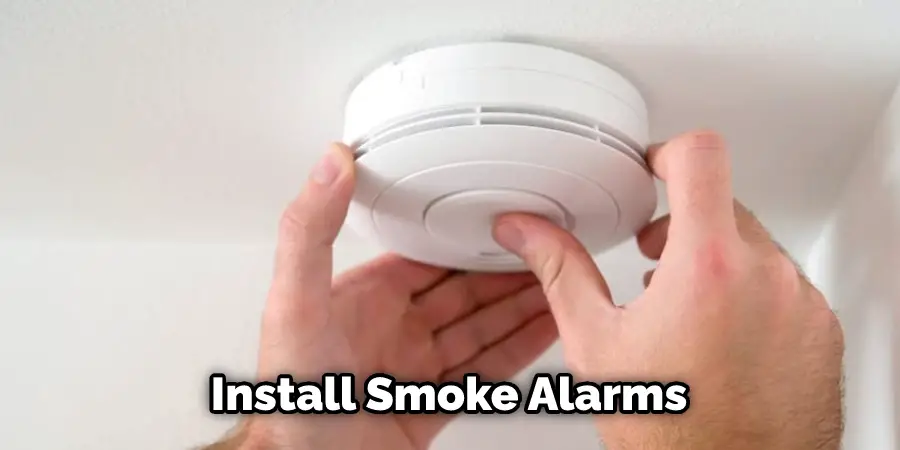You’re not alone if you’ve ever left a light on in your house and gone off to bed, only to worry that you may have caused a fire. In fact, this is a common concern for many people. But is leaving a light on really enough to start a fire? Let’s take a closer look at the facts on can leaving a light on cause a fire?

Can Leaving a Light on Cause a Fire
According to the National Fire Protection Agency, 16,800 home fires are started by electrical failures or malfunctions each year. These fires result in hundreds of millions of dollars in damage and cause thousands of injuries.
Leaving a light on can cause an electrical fire. The heat from the light bulb can build up over time and catch fire. It is also a risk to leave a light on because it can cause an electrical overload.
This occurs when too much electricity flows through the wires, causing them to overheat and start a fire. While it may seem harmless to leave a light on, it’s important to be aware of the potential dangers can leaving a light on cause a fire.
11 Tips to Follow on How to Prevent Lights from Causing Fires
1. Check the Wattage
Make sure you are using the correct wattage light bulb for your lamp or fixture. The higher the wattage, the greater the risk of fire.
2. Keep It Clean
One of the main causes of house fires is dirty or lint-filled appliances. Over time, dust and debris can build up on heaters, lamps, and other devices, causing them to overheat and start a fire. Be sure to clean your appliances regularly to prevent this from happening.
3. Don’t Use Extension Cord
Extension cords are not meant to be used all the time. If you have to use one, make sure it is the right size and type for the appliance or tool. Also, check the cord regularly for cracks or fraying. Never nail or staple it in place.
4. Don’t Overload Outlets
All outlets have a maximum capacity- if you exceed that, it can cause a fire. Be careful with extension cords and power strips, and don’t daisy-chain cords together.
5. Inspect Wiring
If your home is more than 25 years old, then it is time to check the wiring. Wiring that is not up to code can be a fire hazard. If you are not sure if your wiring is up to code, then you can contact a licensed electrician to come and take a look.

6. Inspect the Light Fixture
If you have a standard light bulb in your fixture, make sure it is not loose. A loose light bulb can come into contact with the metal parts of the socket, causing a fire. If you have a fluorescent light, make sure that there are no cracks or holes in the tube. Cracks and holes can cause the gas inside to leak out, and this can lead to a fire.
7. Use the Right Bulb
All outlets have a maximum capacity- if you exceed that, it can cause a fire. Be careful with extension cords and power strips, and don’t daisy-chain cords together.
8. Keep Flammable Objects Away from Lights
While heat lamps are great for keeping your reptile warm, you need to be careful about where you place them. If the lamp is too close to something that can catch fire, like wood chips or paper towels, it could start a fire. Keep any flammable objects at least a foot away from the heat lamp.
9. Don’t Leave Lights on Unattended
One of the main reasons for household fires is leaving lights on unattended. So, if you leave a room, make sure to turn off all the lights. Also, it’s a good idea to invest in LED bulbs. They generate less heat than traditional incandescent bulbs and are less likely to cause a fire.
10. Follow Manufacturer’s Instructions
When using any electrical equipment, it is important to follow the manufacturer’s instructions. These instructions are there for a reason and can help prevent fires.

11. Regularly Test Your Smoke Alarms
Finally, one of the best ways to prevent fires is to have working smoke alarms in your home. These alarms can alert you to a fire before it has a chance to spread, giving you time to get out and call for help. Be sure to test your alarms regularly and replace the batteries as needed.
By following these tips, you can help prevent fires in your home caused by lights. Remember, safety is always the top priority. If you have any concerns about the safety of your home, be sure to contact a licensed electrician. Keep reading for more information about can leaving a light on cause a fire?
Leaving a Light on Can Cause a Fire
Leaving a light on can be a fire hazard under certain conditions. If the bulb is exposed, for example, or in an enclosed space like a lampshade, the heat from the bulb can build up and cause a fire.
It’s also important to make sure that any lights you leave on are in good working condition to avoid potential hazards. If you’re ever in doubt, it’s always best to err on the side of caution and turn the light off.
Leaving a Light on Can Be Costly and Wasteful
It can be costly to leave a light on, whether it is an interior room light or exterior security light. According to Energy.gov, the average household spends about $2 per day, or $730 per year, on electricity for lighting. Depending on the type of bulb and the number of hours it is left on, that cost can be even higher. A single incandescent bulb can cost as much as $4 per year to operate, while an LED bulb can cost less than 50 cents.
In addition to the cost, leaving lights on when you’re not home is wasteful. It’s estimated that 25% of all residential electricity consumption is for lighting and most of that is unnecessary. So by turning off lights when you leave a room, you can save money and energy.
Fire Safety Tips for Homeowners
As a homeowner, it’s important to be proactive when it comes to fire safety. Here are a few tips to help keep your home and family safe from fire:
Install smoke alarms on every level of your home and outside all sleeping areas. Test them monthly and replace the batteries at least once a year.
Develop and practice a fire escape plan with your family so everyone knows what to do if there is a fire.

Keep flammable liquids like gasoline, kerosene, and cleaning products stored in safe, designated areas away from heat sources.
Never leave candles unattended, and make sure all open flames are extinguished before going to bed or leaving the house.
By following these simple tips, you can help keep your home and family safe from fire.
Safety Precautions
If you’re concerned about the risks of leaving a light on, you can take some simple steps to reduce the danger. First, make sure to use energy-efficient light bulbs. These bulbs produce less heat and are less likely to catch fire.
Second, don’t leave lights on for extended periods. For example, if you’re going to be away from home for more than a few hours, it’s best to turn off all the lights.
And finally, if you have any concerns about the safety of your electrical system, contact a licensed electrician to inspect it. Taking these precautions can help ensure that your home is safe from fire hazards.
Is It Safe to Leave a Light on All Night?

Leaving a light on all night can be a fire hazard. According to the National Fire Protection Association, “More fires start in the home between 11 p.m. and 7 a.m. than any other day.” The majority of these fires are caused by things like cigarettes, candles, or cooking accidents; however, electrical fires can also start if faulty wiring or overloaded outlets are left unaddressed.
If you’re going to be out of the house for an extended period of time, it’s best to unplug any appliances that aren’t needed and turn off all the lights. Taking these extra precautions can help prevent a fire from starting in your home.
Frequently Asked Question
What Happens if You Leave a Light on Too Long?
Leaving a light on can cause a fire. When a bulb gets too hot, it can start a fire. If there is anything flammable near the light, it can also start a fire.
Can Light Bulbs Start a Fire?
The answer to this question is a little more complicated than a simple yes or no. In some cases, leaving a light on can cause a fire, while it is less likely in other cases.
Factors that can influence whether or not leaving a light on will start a fire include the type of light bulb, the wattage of the light bulb, how long the light has been left on, and whether or not the light is properly ventilated.

Do Night Lights Cause Fires?
The answer to this question is a resounding “no.” Night lights do not cause fires. Many people might think that leaving a light on can cause a fire, but this is not the case. Light can only cause a fire if it is somehow turned on and comes in contact with something explosive.
For example, if a lamp is turned on and the heat from the light bulb ignites a piece of paper, then the light can be blamed for the fire. However, if the light is turned off and there is no combustible material around it, then the light cannot cause a fire.
Conclusion
While it’s important to be mindful of your energy use, you don’t need to live in the dark out of fear of fire. Just make sure you’re using quality light bulbs and following manufacturer guidelines for installation and use. And if you do experience a fire, remember to have a plan in place to know what to do. Thanks for reading our post about can leaving a light on cause a fire?